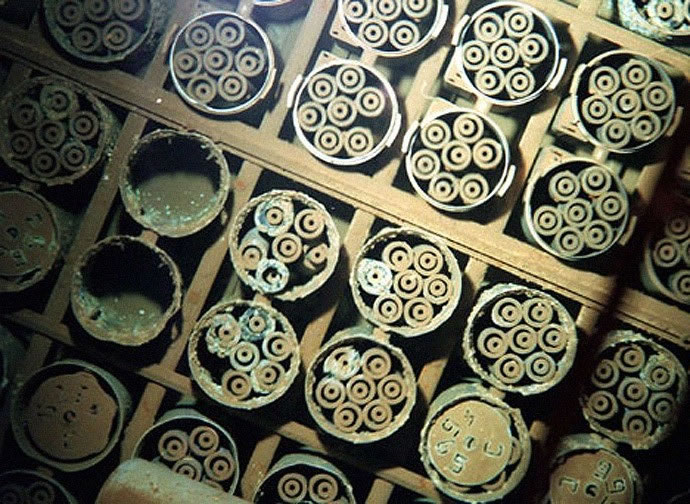
Spent nuclear fuel stored underwater and uncapped at the Hanford site in Washington; via Wikipedia.
By Julie Hussey and JoAnne Day | Nuclear waste is one of those things most people hope someone else is thinking about. The good news is that for 40 years, members of the League of Women Voters of South Carolina (LWVSC) have been following waste issues at the Savannah River Site (SRS). Recent national and international proposals require all South Carolinians to become informed and take action.
Nuclear waste is usually from commercial power production and weapons facilities. All forms of U.S. nuclear waste are the responsibility of the U.S. government. Although the Department of Energy (DOE) and its predecessor agencies have been generically charged with this responsibility, Congress establishes national policies and appropriates funds.
In the 1980s, three governors and their delegations, including our own Gov. Dick Riley, recognized the need to clean up nuclear weapons facilities and develop a repository for nuclear waste. Congress passed the Nuclear Waste Policy Act (NWPA), but for more than 30 years, congressional financing has been irregular and inadequate.
While SRS leadership has wisely used limited congressional appropriations and found stimulus funds to manage the site, actual cleanup will require decades. Other facilities have not fared so well and the proposed Yucca Mountain geologic repository has been fraught with technical and appropriations problems, including a recent Nuclear Regulatory Commission (NRC) determination that DOE does not have the necessary control of lands around Yucca Mountain to accept railroad shipments.
Frustrated by the lack of congressional responsibility to take care of commercial spent fuel, nuclear industry leaders have proposed reprocessing of nuclear waste at “temporary” storage sites. While these proposals suggest local jobs, they present other problems and do not solve the issue of a permanent repository. Such plans also fail to acknowledge that “high burnup” spent fuel is about four times as hot, both thermally and radioactively as old spent fuel and comes with unknown technical, environmental and human challenges.
LWVSC and other SRS watchers noted that SRS, a weapons site, was proposed by industry as one of these “temporary” storage sites, despite decades-old U.S. policy of separating commercial and defense activities. We believed this wise policy would keep spent commercial fuels out of the SRS defense waste site. We also know agencies are required by law to provide public notice before moving waste. What we did not know is that DOE has been making secret plans to bring German commercial fuel and NRC has been making secret plans to bring Illinois/Exelon commercial fuel to SRS. This news is disturbing to say the least.
Rather than following the processes and policies established to protect the human and physical environment, DOE is focused on the money it plans to charge Germany for waste treatment. While we recognize that SRS may be the only well-managed site, SRS should not be “rewarded” with the responsibility to accept international commercial waste just because DOE wants the income. Other labs such as Hanford and Los Alamos are not expected to generate income, and neither should SRS. German nuclear waste should stay in Germany.
Industrial nuclear waste should be the responsibility of the company that managed it. According to its website, Exelon operates the largest fleet of nuclear plants in the nation — 23 reactors at 14 locations. Duke Energy keeps its spent fuel at its own sites, and Exelon should do the same.
Because this waste would be traveling through our state’s ports and on our roads with no option for a final repository, citizens and elected officials can no longer hope that others are thinking about nuclear waste. All South Carolinians must ask their elected leaders why the DOE and the NRC want to fiercely ignore public policies and laws to send commercial waste to SRS. SRS should be rewarded for its efforts by sharing our knowledge and experiences with other facilities, not by allowing others to share their waste and problems with us.
Politicians love to make bold statements about not accepting prisoners from Guantanamo or refugees from Syria into our state. Why are they silent about accepting nuclear waste?
- For more information on nuclear waste in South Carolina check out the League of Women Voter’s issue brief, on the subject.
Julie Hussey and JoAnne Day are co-presidents of the League of Women Voters of South Carolina.



 We Can Do Better, South Carolina!
We Can Do Better, South Carolina!

























Pingback: No Such think as temporary storage | Mayor Billy Keyserling